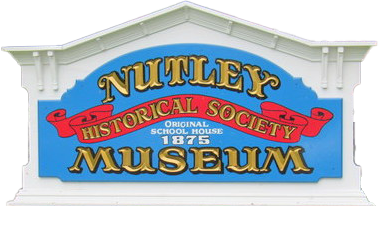BANK OF NUTLEY
ARCHIE C. BARBATA
UNTIL June, 1906, Nutley had no banking facilities whatever. The establishment of the first Nutley bank was due to the initiative of General Bird W. Spencer of Passaic, President of the Peoples Bank and Trust Company of that city. His plan was to enlist the interest of local people, but to retain the control himself.
Accordingly, the certificate of incorporation of the Bank of Nutley was filed in the Office of the Clerk of Essex County on November 15, 1905, by the following persons: Bird W. Spencer, John Howe,*1 Thomas Nichols, Sr., Wilson G. Kierstead,* William A. Lambert,* J. Edward Weeks, Annie L. Van Winkle,* James R. Hay,* Edward E. Poor, Richard J. Scoles.
It was not until June 5, 1906, that the first meeting of incorporators was held in what is now the Health Department Office in Town Hall. The Bank of Nutley then came into being. Bird W. Spencer was its first President; Richard J. Scoles was its first Vice President and J. Edward Weeks was its first Cashier. Thomas J. O’Neil and William F. Dittig became Vice Presidents on June 18, 1906. The first Directors were: Bird W. Spencer, James R. Hay, Wilson G. Kierstead, William F. Dittig, John Howe, Thomas J. O’Neil, Thomas Nichols, Sr., Edmund Wright, Richard J. Scoles, J. Edward Weeks, Edward E. Poor.
John V. Bouvier, grandfather of our First Lady, Jacqueline Kennedy, was elected to the Board of Directors on October 22, 1907, serving until 1908.
At its inception, Bank of Nutley offered many services which were incorporated into five departments including the Commercial Department handling checking accounts of which there were approximately 25; Provident Department handling savings accounts; Safe Deposit Department; Foreign Department; and Mortgage Department handling loans on first mortgages on improved properties located in Nutley.
By 1910, the Bank had outgrown its original simple quarters, necessitating the erection of the building at Chestnut and Vincent Place which housed the Bank until 1926. By July 1914, the bank’s deposits had grown from $3,048.90, at the close of the first day’s business, to $450,000; this was an average annual increase of $56,000 since incorporation eight years before, concluding what may be termed the first chapter of the Bank’s history.
After realizing the advantages of local control, on a day in April, 1914, a group of public spirited Nutley citizens, headed by John Howe and Thomas J. O’Neil, bought the controlling interest from General Spencer and his associates. On April 28, 1914, John Howe became President and ushered in the second period of growth and prosperity.
From 1914 to 1926, deposits increased at an average annual gain of almost $184,000. This expansion is all the more noteworthy, considering the fact that several of these twelve years may be termed war years.
In December, 1919, the Bank entered the Federal Reserve System. The Directors took this action to afford depositors the benefit of the safest and most flexible system of banking yet devised.
On June 16, 1914, Thomas J. O’Neil was elected President after the death of John Howe on May 13. Under Mr. O’Neil’s guidance the Bank enjoyed continuing progress. After ten years of service, Mr. O’Neil died November 14, 1924, and was succeeded by Albert E. Howe, son of John Howe, our second President.
In 1937, the Bank of Nutley purchased the Franklin National Bank which had been organized in 1926 and was located at Franklin Avenue and Centre Street. By the end of 1946, deposits exceeded $12,600,000. The Bank kept pace with this expanded volume without additional facilities until 1951. All efficiencies notwithstanding, Bank of Nutley soon ran out of working space and two steps were taken to relieve the situation. In June, 1951, the First National Bank of Nutley, which had been established in 1919, merged into Bank of Nutley and became the Yantacaw Office. And in October of the same year, the new Franklin Office was opened. Gone were cages and barriers that were for so many years a banking symbol and in their place were open counters and spacious lobbies.
On December 1, 1953, Albert E. Howe died. At a meeting of the Directors on January 5, 1954, Archie C. Barbata was elected President. Since Mr. Barbata’s election as Cashier on October 21, 1941, he had participated largely in the administration of the Bank, for several years as Executive Vice President. As the fifth President, Mr. Barbata’s exclusive business interest has been Bank of Nutley, devoting his full time and energy striving for a better Bank of Nutley and better banking on County, State and National levels.
Mr. Barbata was appointed by President Dwight D. Eisenhower to serve on the Annual Assay Commission for 1955. The purpose of this Commission is to examine and test the weight and fineness of the silver coins reserved by the Mints of Philadelphia, San Francisco and Denver, during the previous calendar year.
The present executive officers of the Bank are: Alexander Baker, Irving T. Cueman and Walter D. Moore, Jr., Vice Presidents and Joseph S. Bator, Cashier. The present Directors are: Archie C. Barbata, Alexander Baker, Edgar A. Dunham, Jr., James P. Hatch, Wayne K. Johnson, David Nichols, Walter J. Sutcliffe, Louis Viola.
Today, the Bank has resources exceeding thirty-three million dollars and 23,500 depositors. The services extended to the community in 1906 are still in effect; but, in addition many services not even thought about fifty years ago, have become a familiar and necessary part of modern banking.
The deposits which people of Nutley have confidently entrusted to the Bank have been largely responsible for the Town’s growth. Through several generations, there has been a direct relationship between the growth of the bank and growth of the community.
1Those marked with an asterisk were from Nutley; the others from out-of-town.
